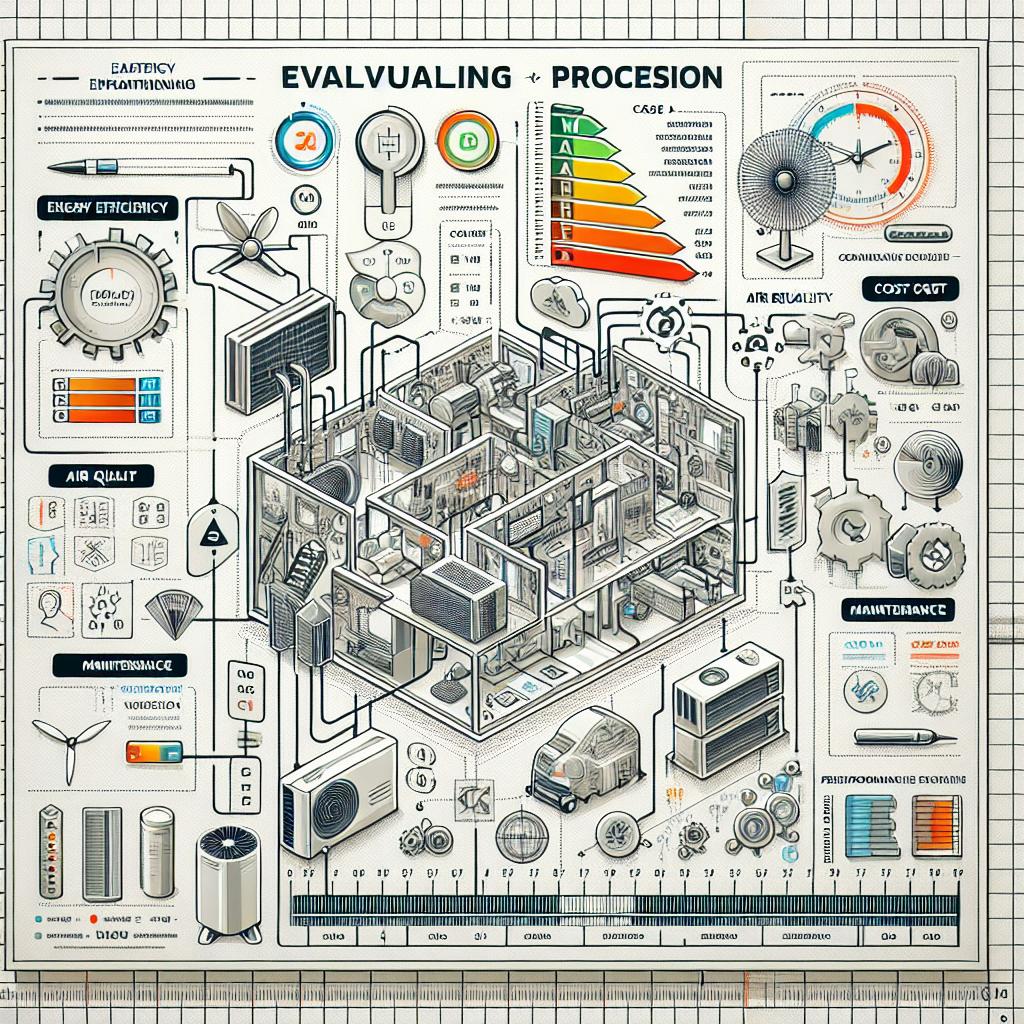When seeking comfort in our homes and workplaces, few elements are as crucial as an efficient heating, ventilation, and air conditioning (HVAC) system. With the changing seasons and fluctuating temperatures, the demand for reliable HVAC units has never been higher. But with the myriad of brands and models flooding the market, the question remains: who truly makes the best HVAC units? This article embarks on a journey through the labyrinth of HVAC options, exploring the key players in the industry, their technological innovations, customer satisfaction ratings, and value for money. Whether you are a homeowner looking to upgrade your system or a businesses seeking optimal climate control, understanding the landscape of HVAC excellence will arm you with the knowledge to make an informed choice. Join us as we navigate through the leading contenders and uncover what distinguishes the best from the rest in the world of HVAC units.
Evaluating HVAC Performance: Key Features to Consider
When it comes to assessing the effectiveness of HVAC units, there are several essential features that can greatly influence their performance. First and foremost, energy efficiency rates, often represented by SEER (Seasonal Energy Efficiency Ratio) for cooling systems and AFUE (Annual Fuel Utilization Efficiency) for furnaces, should be at the forefront of consideration. A higher rating indicates a system that consumes less energy, translating to lower utility bills and a smaller environmental footprint. Additionally, system capacity, usually measured in BTUs (British Thermal Units), is crucial; an appropriately sized unit ensures that your space is adequately heated or cooled without unnecessary strain on the system.
In addition to efficiency and capacity, noise levels during operation can significantly affect comfort, particularly in residential settings. Look for models that offer variable-speed blowers which not only optimize airflow but also minimize sound. Moreover, modern HVAC systems often come equipped with smart thermostat compatibility, enabling homeowners to easily control indoor temperatures remotely and program schedules to enhance energy savings. Furthermore, it’s wise to consider the warranty and service options available; robust warranties and responsive customer service can substantially reduce long-term maintenance costs. Highlighting these key features can guide consumers toward making informed decisions in their pursuit of the best HVAC unit for their needs.

Top Brands in HVAC: Analyzing Reputation and Reliability
When considering HVAC units, it’s essential to evaluate brands that have established a solid reputation for quality and reliability. Some of the most recognized names in the industry include:
- Trane – Known for its robust engineering and extensive warranty options.
- Carrier – A pioneer in HVAC, providing energy-efficient solutions for both residential and commercial needs.
- Lennox – Offers innovative technology and high SEER ratings, making them a top choice for modern homes.
- Rheem – Focuses on durability and performance, with a strong track record in heat pump systems.
- York – Recognized for their affordable yet reliable units, perfect for budget-conscious consumers.
Another factor to consider is consumer feedback regarding the reliability of these brands. A comparison of warranty lengths and customer reviews reveals the following insights:
| Brand | Warranty (Years) | Customer Satisfaction (Rating out of 5) |
|---|---|---|
| Trane | 10 | 4.5 |
| Carrier | 10 | 4.6 |
| Lennox | 10 | 4.4 |
| Rheem | 10 | 4.3 |
| York | 10 | 4.1 |
This analysis highlights not only the available warranties but also customer satisfaction ratings, providing a clearer picture of which brands stand out in the competitive HVAC market. By weighing these factors—brand reputation, performance, and user experiences—you can make a more informed decision when selecting the right HVAC unit for your needs.

Energy Efficiency in HVAC Systems: Finding the Best Options
When evaluating HVAC systems for energy efficiency, it’s essential to consider several critical factors that can contribute to both performance and sustainability. High-efficiency units are designed to consume less energy while delivering optimal heating and cooling. Key features that indicate superior energy efficiency include:
- SEER Ratings: The Seasonal Energy Efficiency Ratio (SEER) measures cooling efficiency. Look for units with a SEER rating above 16.
- AFUE Ratings: The Annual Fuel Utilization Efficiency (AFUE) indicates the efficiency of heating systems, with ratings of 90% or higher being ideal.
- Variable Speed Technology: Units with variable speed compressors offer better humidity control and lower energy costs compared to traditional single-speed models.
Additionally, proper sizing and installation are pivotal to maximizing energy efficiency. An oversized unit may cycle on and off too frequently, leading to energy wastage, while an undersized unit may struggle to maintain desired temperatures. Investing in professional evaluation and installation can enhance the performance of your chosen HVAC unit. An energy-efficient system not only supports environmental sustainability, but it can also significantly lower utility bills over time. Here’s a quick overview of popular manufacturers that excel in energy-efficient HVAC options:
| Manufacturer | Energy Efficiency Features | Notable Models |
|---|---|---|
| Trane | High SEER ratings, variable speed technology | XV20i, XL18i |
| York | Quiet operation, enhanced humidity control | YXV, YZV |
| Lennox | Smart technology integration, high AFUE ratings | S XP25, S XC25 |

Customer Satisfaction and Support: Insights from Real Users
The heart of customer satisfaction in the HVAC industry lies in users’ experiences with the units themselves and the support they receive post-purchase. Many customers rave about the reliability and performance of certain brands, such as Trane and Carrier, noting how these units maintain optimal temperatures even in extreme weather conditions. Additionally, effective energy efficiency is a common theme among users, who appreciate lower utility bills as a result of investing in high-quality systems. However, when issues arise, it’s the support services that make or break a customer’s loyalty. Support teams that are responsive and knowledgeable significantly enhance the overall user experience.
Real users have shared their feedback about how the warranty terms and customer service interactions impact their overall sentiment towards their HVAC provider. Many valued brands maintain an engaging support platform, offering various channels such as live chat and 24/7 phone assistance. Here’s a glimpse of how some of the notable HVAC brands stack up in customer service metrics:
| Brand | Customer Service Rating | Warranty Length |
|---|---|---|
| Trane | 4.7/5 | 10 Years |
| Carrier | 4.5/5 | 10 Years |
| Lennox | 4.3/5 | 5 Years |
| Goodman | 4.0/5 | 10 Years |
Moreover, customers appreciate brands that provide comprehensive maintenance support plans. These include:
- Regular system check-ups
- Discounts on parts and labor
- Priority scheduling for repairs
Such proactive support not only ensures the longevity of their HVAC units but also fosters a lasting relationship between consumers and their chosen brands. In essence, the harmony between reliable products and trustworthy support ultimately shapes customer loyalty and satisfaction in the HVAC market.
Q&A
Q&A: Who Makes the Best HVAC Units?
Q1: What factors should I consider when determining a “best” HVAC unit?
A1: The term “best” can vary depending on individual needs. Key factors to consider include energy efficiency ratings (SEER for cooling, AFUE for heating), reliability, noise levels, maintenance requirements, brand reputation, and warranty options. It’s essential to prioritize what matters most to you, whether that’s cost-effectiveness, performance, or environmental impact.
Q2: Are there specific brands known for producing high-quality HVAC units?
A2: Yes, several brands are frequently recognized for their quality. Trane and Carrier are often at the forefront, praised for their durability and advanced technology. Lennox and Rheem also receive high marks, particularly for energy-efficient models. Additionally, Goodman offers solid options in terms of value for money, especially for budget-conscious consumers.
Q3: How do energy efficiency ratings affect my choice?
A3: Energy efficiency ratings (like SEER and AFUE) play a crucial role in both performance and long-term costs. Higher ratings typically mean lower energy bills, which can lead to substantial savings over the lifespan of the unit. Invest in a unit with a good balance between efficiency and upfront costs to maximize your return on investment.
Q4: Is brand loyalty important when selecting HVAC units?
A4: Brand loyalty has its place, but it’s more important to prioritize reliability and performance tailored to your specific needs. While some brands build a legacy of trust, individual models can vary widely in quality. Always read reviews and seek ratings for the specific model you’re considering.
Q5: Should I consider installation quality when choosing an HVAC unit?
A5: Absolutely! No matter how top-of-the-line your chosen HVAC unit may be, poor installation can severely compromise its efficiency and lifespan. It’s essential to hire qualified professionals with strong reputations. A well-installed system can maximize performance, minimize repairs, and ensure safety.
Q6: How often should I replace my HVAC unit?
A6: Generally, HVAC units last between 10 to 15 years. If your system is reaching this age and frequently needs repairs or is showing declining efficiency, it may be time to consider a replacement. Regular maintenance can extend the life of your unit, but keep an eye on performance metrics.
Q7: What about warranties and customer support?
A7: Warranties can be a significant indicator of a brand’s confidence in its products. Look for manufacturers that offer extensive coverage and clear customer support options. This can save you from unanticipated expenses down the road and provide peace of mind.
Q8: Can personal reviews alter the perception of a brand’s HVAC performance?
A8: Personal reviews can definitely provide valuable insight into user experiences and satisfaction. However, it’s important to consider a broad range of feedback rather than relying solely on individual testimonials. Consistency in either positive or negative reviews can help inform your decision more accurately.
Q9: So, who ultimately makes the best HVAC units?
A9: There’s no one-size-fits-all answer. The best HVAC unit depends on your specific needs, budget, and local climate. Researching and comparing various models and brands will help you arrive at the best option for your unique circumstances. Ultimately, the best choice balances performance, efficiency, and reliability tailored to your specific home and lifestyle.
In Retrospect
the quest for the best HVAC unit is not a straightforward journey; it’s a blend of personal needs, brand reliability, energy efficiency, and cutting-edge technology. As you navigate through various options, remember that the ideal choice will depend on your specific requirements and preferences. Whether you lean towards industry leaders known for their innovation or niche brands offering exceptional value, taking the time to research will pay off in the comfort of your home. Ultimately, the “best” HVAC unit is one that harmonizes with your lifestyle and budget, ensuring that you stay cool in the summer and warm in the winter. So, as you embark on this endeavor, keep your priorities in focus and breathe easy, knowing that with the right information, you’re well on your way to finding the perfect climate control solution.

